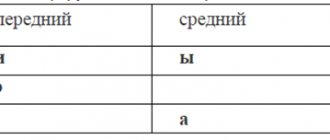A sentence is a speech unit that combines several words related to each other. Each such construction has a specific meaning and intonation. There are several types of sentence intonation. They can also end accordingly using different punctuation marks. What are the suggestions for the purpose of the statement and intonation?
What is sentence intonation?
Intonation is one of the important characteristics of a sentence. Let's start by defining what is called intonation.
This word is of Latin origin: the verb intonare literally means “to pronounce loudly.” In the syntax of the Russian language, the term “intonation” denotes the rhythmic and melodic structure of a sentence, as it is pronounced in oral speech, with a rising or falling tone.
Let us consider in more detail the intonation with which sentences are pronounced and what emotional connotation they have.
Table
| BY INTONATION | ||
| exclamation point | Non-exclamatory | |
| They gave me a kitten! | They gave me a kitten. | |
| FOR THE PURPOSE OF THE STATEMENT | ||
| Narrative | Interrogative | Incentive |
| The weather is beautiful outside. | Why are you staying at home? | Go for a walk. |
Basic elements of intonation
Our speech is enriched by various elements, making it expressive, emotional, rich.
- Speech melody (raising and lowering voice)
- Logical stress (highlighting in the voice the most important word)
- Pause (temporary stop of speech)
- Tempo (speech speed)
- Tone (sound coloring that gives emotional shades to speech)
These elements enhance the impact of speech on the listener. Without them, our speech would be lifeless, gray, inexpressive.
Types of sentences by intonation
Based on the intonation and strength of the expressed feeling, and the emotional coloring, two types of sentences are distinguished:
- exclamation marks
- non-exclamatory.
Non-exclamatory sentences
Every sentence has end-of-sentence intonation. If the statement is pronounced calmly, without much emotional stress at the end, it is a non-exclamatory sentence.
Definition
A sentence in which no feeling is expressed is called non-exclamatory.
Examples of non-exclamatory sentences
Late at night it began to rain heavily. He merrily knocked on the windows, made a dashing noise in the dense foliage of the trees, and busily gurgled in the drainpipes (L. Lagin).
In summer, the abundant clusters of glossy black berries immediately catch the eye (V. Soloukhin).
A large area of the old city above the Dnieper is overgrown with grass. It was quiet and orderly here. Swallows hovered over the cathedral of Catherine's times (A. Tolstoy).
Exclamatory sentences
Simple sentences can further express the emotions and feelings of the speaker. Then they are pronounced with a special exclamation intonation.
In the village it is much more free than in the city. You can go to the forest to pick berries, and to the river to swim and fish. And for lunch, what a soup! (G. Skrebitsky).
The last sentence in this message is exclamatory in intonation, as it expresses a feeling of admiration.
In exclamatory sentences, pronouns and adverbs are used as intensifying particles:
My dear, how beautiful! What is there to admire here? Oh, I admit - even though it hurts me, I’m also wrong! (I. A. Krylov)
Incentives
These are sentences that contain an order, request, advice or appeal. In other words, they encourage a person to do something.
Don't put your fingers in the socket! (order) Take care of nature! (call) Pass me the salt, please. (request) Teach a little more. (advice)
As you can see from these examples, incentive sentences do not always end with an exclamation mark. Sometimes they just have a period at the end.
In oral speech, such sentences are very easy to recognize. They are usually pronounced in a higher voice .
Suggestions for the purpose of the statement
According to the purpose of the statement - message, question, motivation - simple sentences are divided into three types:
- narrative
- interrogative
- incentive
Each of these simple sentences can be an exclamation point.
Declarative sentence
In oral speech, the sentence is pronounced calmly and evenly, only the voice rises on one of the members of the sentence and decreases towards its end. This is narrative intonation, and this type of sentence is called declarative . It reports or states an event or fact, for example:
It snowed yesterday.
The second day it rains like buckets.
At the end of a declarative sentence there is a final punctuation mark - a period.
Examples of narrative sentences in fiction
The white birch tree under my window was covered with snow like silver (S. Yesenin).
The endless road runs away like a ribbon into the distance (S. Yesenin).
In one swamp, under a wild willow, ducklings hatched (M. Prishvin).
Dandelions bloom from spring to autumn (V. Soloukhin).
The sun was already setting behind the forest. It cast several slightly warm rays, which cut a fiery stripe through the entire forest (I. Goncharov).
Interrogative sentences
According to the purpose of the statement, interrogative sentences are distinguished , which In oral speech, the voice rises intonationally on the word that is the main one in the question, for example:
feed the dog today
today ?
you today ?
This emphasis by voice on an important word in a sentence is called semantic or logical stress .
You must put a question mark at the end of an interrogative sentence.
Examples of interrogative sentences in fiction
Do you know what a pleasure it is to go out before dawn in the spring? (I. Turgenev).
The boys felt sorry that the little fox ran away. Where does he go so small? Will disappear in the forest. Grandfather came, looked at the hole, shook his head and said: “No, guys.” It wasn’t the little fox who dug the hole. It was the mother fox who came for him (V. Bianchi).
The little son came to his father and asked the little one: “What is good and what is bad?” (V. Mayakovsky).
What is this song of carriage wheels, And the chirping of birds, And the rustling of birches? About the homeland, only about the homeland (Rasul Gamzatov).
What are boys made of? What are boys made of? From snails, shells, and green frogs (S. Marshak).
Incentive offer
If a sentence expresses an impulse, a request, an order, a strong feeling, then the intonation becomes motivating. Then the sentence is pronounced with a raised voice, tense. An incentive sentence is characterized by a higher tone than a narrative sentence, but lower than a question.
Come to me!
Sit next to me on the bench!
Let's admire this beauty!
Example sentences
The monkey stood up straight. The parrot commanded: “The exercise has begun!” Feet together! Hands apart! One two three four! Legs up! Wider your arms! (Grigory Oster)
And the rain is falling harder and harder... A wet Butterfly crawls towards the mushroom: - Ant, Ant, let me under the fungus! I'm wet - I can't fly! (V. Suteev).
Don't stop me from working! I’ll bring some water and, of course, I’ll treat everyone with well water (E. Blaginin).
Interrogative
Interrogative sentences always contain a question. And at the end of it there is either a “question mark” (which is most often), or “question and exclamation” marks at the same time.
Do you promise to do it by this evening? How long can this go on?!
Intonationally, in interrogative sentences, the voice rises on the word that is the main one in the question.
Moreover, there can be several such words in the same sentence. And depending on the emphasis, the question itself changes.
Have you already DONE your math homework? Have you already done your math homework? Have you done your MATH homework yet?
Also, interrogative sentences can either contain a specific question word or do without it.
Where are you planning to go?
Will you come with us?
Grammatical features of a narrative exclamatory sentence
The first is intonation, which can convey both positive (joy, surprise, etc.) and negative (anger, anger, etc.) emotions. When pronouncing such a sentence, the highest pitch falls on the word that conveys the emotion.
Also, exclamation is often conveyed by special interjections, such as ah, oh, wow, and so on. Finally, this is done using exclamation particles.
In writing, such intonation fullness is conveyed using a special punctuation mark - an exclamation mark.
In some cases, the same declarative sentence can be pronounced with even intonation, or with an exclamation, giving it an emotional overtones.
Incitement to action
The third group includes incentive offers. They are used to call people to any action. For this purpose, incentive intonation is used. Particles, interjections, and verb forms are also used to construct such constructions. Often such sentences contain appeals.
Guys let's be friends!
Passengers, please enter the carriage.
Clean your room immediately.
With the help of incentive sentences you can express the following:
- forbid;
- ask;
- order;
- instruct;
- forbid;
- advise.
Question
The second group includes interrogative sentences. They are used accordingly to ask various questions. A special intonation is used for this. At the end of such sentences a question mark is written. They use question words: when, where, why, where. You can ask using particles or adverbs: often, exactly, whether, perhaps, really. You can also construct an interrogative sentence using a special word order.
When will you go to the museum?
Are you really going to go to the museum?
Will you go to the museum?
Here are the actions performed using interrogative sentences:
- to question;
- interrogate;
- find out;
- beg;
- find out;
- elicit;
- to scout;
- pry out.
Narration
The first group includes narrative sentences. In them something is reported, something is described (narrated). At the end of such constructions the voice is lowered and they contain a complete thought.
My friends go to kindergarten. (Tells or tells that friends go to kindergarten).
Peonies and tulips bloomed in the flowerbed. (Reports that peonies and tulips have bloomed in the flowerbed).
Children can be offered some more verbs that characterize narrative sentences:
- notify:
- exchange;
- explain;
- inform;
- announce;
- report;
- inform.
Features of a narrative exclamatory sentence with examples
Such a syntactic unit can be complicated in various ways, including homogeneous predicates. Exclamatory sentences can be both two-part and one-part, common and uncommon, the most important thing in this case is the conveyed emotion.
If we look at examples of narrative exclamatory sentences, it will become clear that they perform many different functions: they can enhance the emotional impact on the reader and help convey the speaker’s mood. In addition, important parts of the text are highlighted in this way.
Eh, nothing worked out for Marusya and me! – exclamation, with the help of an exclamation the author expresses the annoyance that overcomes him due to failure in his relationship with a girl.










